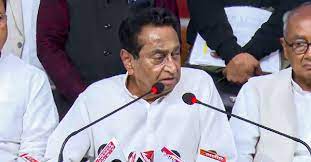
In the aftermath of the Bharatiya Janata Party’s (BJP) victory in the recent state elections in Chhattisgarh, Rajasthan, and Madhya Pradesh, some Congress leaders have raised eyebrows over alleged voting irregularities and the reliability of electronic voting machines (EVMs). These concerns surfaced following reports of some former MLAs claiming they received an unexpectedly low number of votes in their respective villages.
Senior Congress leaders, including Kamal Nath and Digvijaya Singh, have voiced their astonishment at the Madhya Pradesh election results but have refrained from directly alleging electoral malpractices. Kamal Nath, who spearheaded the Congress campaign in Madhya Pradesh, expressed his intention to converse with both winning and losing party candidates to scrutinize the factors contributing to the party’s subpar performance.
Mr. Nath refrained from drawing premature conclusions regarding alleged EVM tampering, emphasizing the necessity for discussions before forming any definitive opinions. He highlighted instances where some MLAs purportedly received fewer than 50 votes in their villages, prompting doubts about the election process’s integrity.
The concerns echoed by Mr. Nath were complemented by Digvijaya Singh’s longstanding skepticism about EVMs, asserting that any machine with a chip could be susceptible to hacking. Singh questioned the reliability of electronic voting, urging the Election Commission of India and the Supreme Court to defend Indian democracy against potential threats posed by professional hackers.
Despite accepting the public mandate and congratulating the BJP on its victory, Mr. Nath underscored his trust in the Madhya Pradesh voter while asserting that the Congress would responsibly fulfill its role as the opposition party.
The Congress’s unexpected setback in Madhya Pradesh, contrary to exit poll projections, has prompted internal evaluations and raised concerns about the party’s strategy and campaign efficacy. Questions have emerged about the state Congress’s rally frequency, campaign vigor, and handling of alliances within the opposition bloc, affecting their collective stance against the BJP.
The opposition’s divided front in the state elections has prompted discussions about the necessity for a united front to challenge the BJP’s dominance in future elections, emphasizing the importance of cohesive opposition strategy in countering the ruling party’s stronghold.
As deliberations continue within the Congress regarding the election outcome and concerns about voting integrity persist, the party gears up to navigate its role in the opposition while evaluating internal strategies to fortify its position ahead of future electoral battles.
Sources By Agencies


